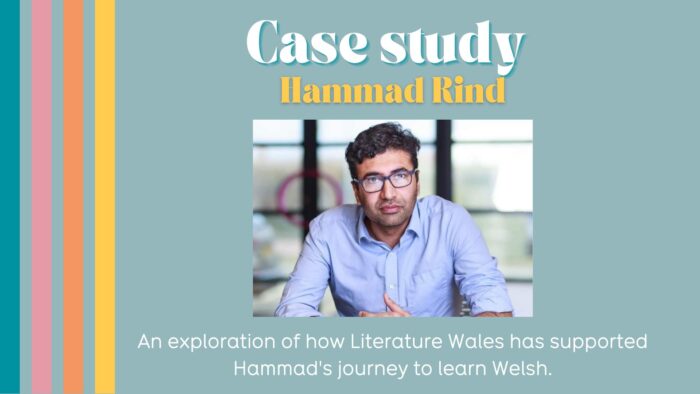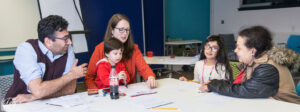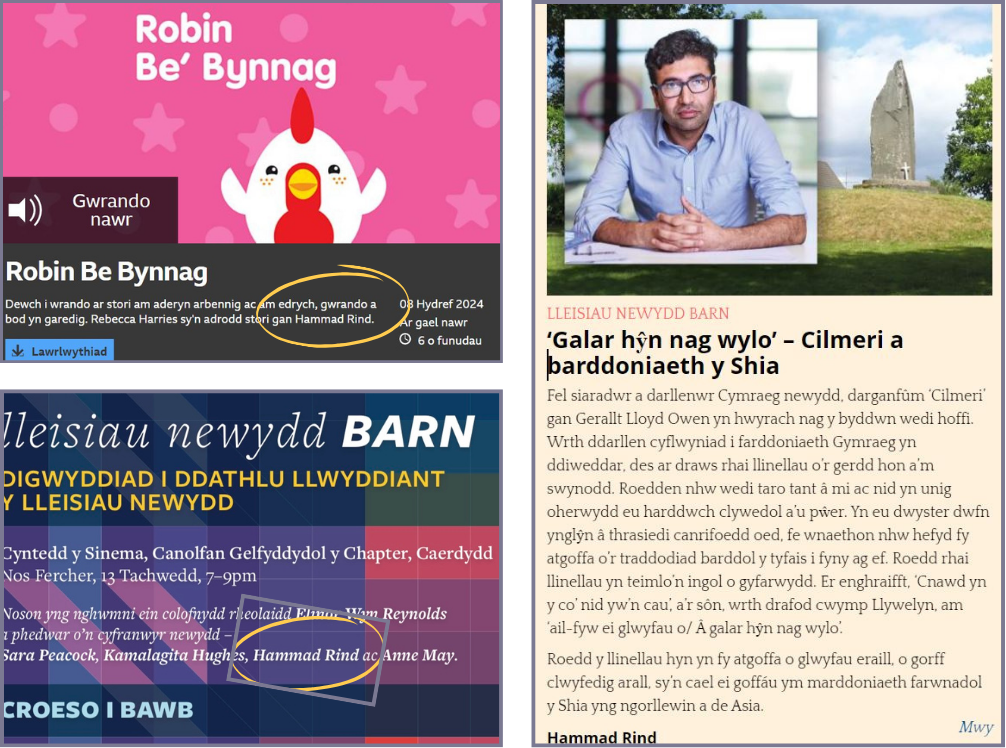Case Study: Hammad Rind

Hammad Rind was born in Punjab, Pakistan, and currently lives in Cardiff. His stories, articles and book reviews have appeared in numerous UK and international magazines. He regularly leads workshops on creative writing, storytelling and Eastern literature.
His debut novel, Four Dervishes, was published by Seren in 2021. Jon Gower said it was “Without doubt, one of the most remarkable novels to come from Wales for years.” He is currently working on his second novel.
He can speak nine languages, including Urdu, Punjabi, Hindi, Persian, Turkish, Italian and French, and adds authenticity and individuality to his work by incorporating elements of these different languages and cultures into his writing.
Background

Over the years, Hammad has participated in a number of our writer development programmes.
Back in 2019, Hammad attended a trip to Hay Festival organised by Literature Wales in partnership with the festival for members of the open mic group ‘Where I’m Coming From’. The trip was a golden opportunity to meet other Welsh writers and boosted Hammad’s confidence and increased his investment in his work.
Shortly after, he won his place on the pilot programme Platforming Under-represented Writers. He used the sponsorship he received to run a series of writing and illustration workshops for children from black, Asian and minority ethnic backgrounds, in Grangetown with the aim of celebrating the multicultural diversity of the area.
In 2021 he was commissioned to run a project named Morfil Trelluest, which used the arts – creative writing and painting – for the benefit of residents in Grangetown who are troubled with their health, thoughts or feelings of belonging as members of diasporic communities.
Learning Welsh & Representing Wales
In 2023, Hammad was selected to be one of the Representing Wales cohort, a programme that provides opportunities for underrepresented writers in the literary sector to develop their craft and understanding of the literature and publishing industry.
Most recently, Hammad was one of Hay Festival’s ‘Writers at Work’ cohort, a programme that gives writers the opportunity to attend workshops with publishers, agents and, crucially, with some of the established international artists taking part in the festival.
“Literature Wales is a supportive organisation that has gone above and beyond what is expected in sharing opportunities and resources and in encouraging me on my journey.”
The ‘Representing Wales’ writer development programme is now heading towards its fifth round, with the latest cohort of writers looking to receive a year of intensive development in spring 2025. The programme is bilingual, open to writers writing in both Welsh and English.
One lovely element of mixing writers working in both languages is the fact that attention is given to the Welsh language, with the benefit of practice and composing in the language being highlighted to the cohort of writers writing in English. The programme has done a good job of bridging the communities of writers in Wales who write in either language.
One natural element of this assimilation between the language groups was that non-Welsh writers were keen to learn more about Welsh language, and learn more Welsh. And that’s where the special relationship between Literature Wales and the National Centre For Learning Welsh began.
The Centre shares Literature Wales’ vision of wanting to give more opportunities to underrepresented individuals – therefore collaborating on the Representing Wales programme is a golden opportunity to develop new Welsh speakers from diverse backgrounds.
Representing Wales is a programme that offers literary training over the course of a year, including a personal mentor and a £3K scholarship. But in addition to the craft development kit and literary knowledge, we also offer the writers the opportunity to join Welsh language learning classes free of charge.
Classes take place online, with a residential course at Tŷ Newydd being an addition to the digital learning at the end of the programme. This year, the course focuses on Entry level – brand new Welsh speakers.
In recent years, learners at different levels have taken part in Welsh classes through the Representing Wales programme – including fluent Welsh speakers who had lost confidence in their use of the language. A few of those learners are now experimenting with Welsh in their writing.
Hammad’s journey to learn Welsh
We caught up with Hammad to hear more about his reasons for learning Welsh, and how he hopes his journey with the language will develop in the future, here’s what we asked him:
1. What motivated you to want to learn Welsh?
2. Has a course/project/programme by Literature Wales helped you on the journey to learn the language?
3. What’s next for you in terms of using Welsh in your life/work as a writer?
Hammad’s upcoming projects
Following his success in learning Welsh, of which he is now fluent, here are some of the opportunities that have arisen for Hammad recently…

- Hammad was chosen to write a short story for children which is featured on Stori Tic Toc (Cyw, S4C) called ‘Robin Be’ Bynnag’.
- Hammad is also one of the new voices for Cylchgrawn Barn – a Welsh magazine, having written a fascinating article about the history of Cilmeri and the poetry of the Shia.
Hammad’s journey to learn Welsh in such a short space of time is a very inspiring one.
We are proud to have played a small part in Hammad’s journey to learn the language and to use Welsh in his writing career as a writer, as well as giving him the opportunity to practice his Welsh at Tŷ Newydd in an informal and natural way which has been a golden opportunity for him.